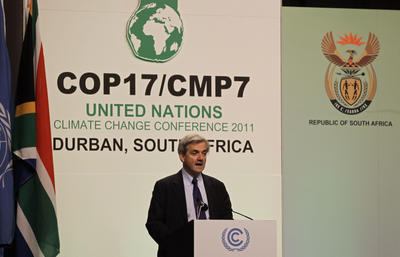These agreements, known as the ‘Durban Platform’, also include the implementation of the Green Climate Fund, the establishment of an Adaptation Committee, and the further development of REDD+ (helping to reduce emissions from deforestation and forest degradation).
But the results of Durban’s climate negotiations need to be cautiously analysed, since they could potentially have different implications for the planet generally and developing countries like Indonesia more specifically. Whether Durban resulted in decisions which clearly translate into global action to cut GHG emissions — and to financially and technologically support mitigation and adaptation in developing countries — is crucial to Indonesia.
Developing countries in Durban, for instance, managed to have developed countries agree to the inclusion of a second commitment period of the Kyoto Protocol, which will commence in January 2013, as part of the Durban Platform. This will avoid a gap at the end of the Protocol’s first commitment period, ending in 2012. But the Protocol, having set binding targets for 37 developed countries to reduce GHG emissions to 5 per cent below 1990 levels by 2012, may lose its significance in the second period since some countries like Canada, Japan and Russia are reportedly unwilling to take part. And with the US still opting out, the Protocol will likely only achieve small reductions in GHG emissions.
The Durban Platform also included a roadmap to negotiate a new global treaty covering all countries to reduce GHG emissions. Negotiations for this treaty are expected to conclude by 2015, and the treaty will come into force from 2020. But many climate analysts are not convinced by the direction of this particular agreement. Although covering both developed and developing countries, including Indonesia, the projected emissions resulting from this treaty — based on the current pledges made by these countries since Copenhagen COP-15 in 2009 — may lead to a global average temperature rise of more than 3.5 degrees Celsius. This means that the future of people all around the world, and particularly in vulnerable countries like Indonesia, is at stake.
Consequently, new commitments and action to address the ‘emissions gap’ are needed, so the planned treaty can effectively tackle climate change. By the end of Durban, there were no new pledges for stronger emissions reductions. Additionally, waiting until 2020 for the treaty to take effect may be too late; there is a huge risk that the limit of emissions in the atmosphere will already have been reached, such that actions to stabilise the climate will be next to impossible and too expensive.
A formal structure for the Green Climate Fund — and a work plan by which it will operate, mobilising funds from both private and public sources — was also included in the Durban Platform. A number of countries signalled their readiness to contribute to the fund, but realising their promises may prove daunting — especially in the wake of the global financial crisis. This situation has left many unanswered questions for developing countries, since the fund was created to support policies and actions aimed at addressing climate change in these states.
Also, the negotiations on finance, specifically for the Green Climate Fund, have not resulted in the establishment of a specific funding window for REDD+ at the global level. If agreed to, this would provide significant support for tropical-forest nations, including Indonesia, to further develop their REDD+ programs at national and local levels. Significantly, Durban did produce an agreement exploring a variety of financial sources — ranging from public and private finance to market mechanisms — which could lead to financial support for REDD+. This agreement could not only open the door for new and long-term investments in REDD+, but also help ensure the future of investments already in place. But the rules pertaining to safeguards in the REDD+ decision appear to be weak, especially when it comes to rules on protecting indigenous communities and biodiversity. This may undermine the credibility of REDD+ and make it unattractive to investors.
Another positive decision reached in Durban, especially for vulnerable countries like Indonesia, is the establishment of the Adaptation Committee, which will coordinate adaptation activities on a global scale.
Overall, the Durban climate talks have provided mixed results for developing countries like Indonesia. There was some marginal progress, but huge questions remain. Political promises and weak agreements will hardly reduce GHG emissions. Only strong decisions and real action can demonstrate the level of seriousness in addressing climate change. It is therefore imperative that Indonesia continues to work hard, unilaterally and with other countries, on climate change mitigation and adaptation. Without this, the nation’s survival and the fate of the planet looks uncertain and grim.
Fitrian Ardiansyah is a PhD student at the Australian National University, and the recipient of the Australian Leadership Award and Allison Sudradjat Award.
A version of this article first appeared here in the Jakarta Post.

